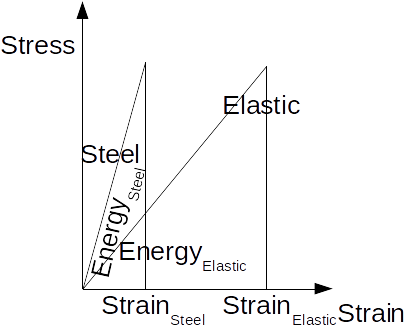Suppose we have a steel cable and an elastic cable, both with the same cross sectional area. For a given force the elastic and steel cables will both be subject to the same stress (
\[Sires = \frac{Force}{Cross Sectional Area}\]
), but the elastic cable will have a higher strain ( \[Strain=\frac{Extension}{Original Length}\]
) so will store more energy.
\[x_{Elastic}=0.25l , \: x_{Steel} =0.002 l\]
.\[ =k_{Elastic} x_{Elastic}\]
\[F =k_{Steel} x_{Steel}\]
Hence
\[k_{Elastic} x_{Elastic} =k_{Steel} x_{Steel} \rightarrow \frac{k_{Steel}}{k_{Elastic}} = \frac{x_{Elastic}}{x_{Steel}} \]
.The energy stored in each is
\[ E_{Elastic}=\frac{1}{2}k_{Elastic} x^2_{Elastic}\]
\[E_{Steel} = \frac{1}{2} k_{Steel} x^2_{Steel}\]
Hence
\[ \frac{E_{Elastic}}{k_{Steel}}=\frac{k_{Elastic}}{k_{Steel}} \frac{x^2_{Elastic}}{x^2_{Steel}} = \frac{x_{Steel}}{x_{Elastic}} \frac{x^2_{Elastic}}{x^2_{Steel}}= \frac{x_{Elastic}}{x_{Steel}}=\frac{0.25}{0.002}=125 \]
The elastic cable stores over a hundred times more energy.
